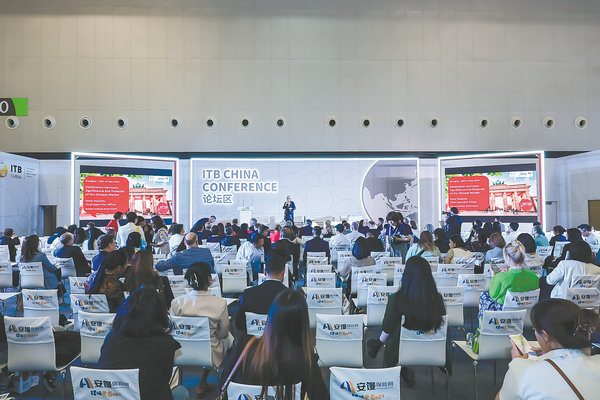
- Home
- Media Center
-
Events
- Wuzhen Summit
- Regional Forums
- Practice Cases of Jointly Building a Community with a Shared Future in Cyberspace
- World Internet Conference Awards for Pioneering Science and Technology
- The Light of Internet Expo
- Straight to Wuzhen Competition
- Global Youth Leadership Program
- WIC Distinguished Contribution Award
- Membership
- Research & Cooperation
- Digital Academy
-
Reports
- Collection of cases on Jointly Building a Community with a Shared Future in Cyberspace
- Collection of Shortlisted Achievements of World Internet Conference Awards for Pioneering Science and Technology
- Reports on Artificial Intelligence
- Reports on Cross — Border Ecommerce
- Reports on Data
- Outcomes of Think Tank Cooperation Program
- Series on Sovereignty in Cyberspace Theory and Practice
- Other Achievements
- About WIC
- 中文 | EN

Germany gives Chinese tourists digital hand

A German delegation organized by the German National Tourist Board attends the travel trade show ITB China to explore opportunities. [Photo provided to China Daily]
"The next step is the implementation of seamless connectivity along the entire value chain. This includes synchronizing booking systems, transportation, accommodation and activities, offering consistent and uninterrupted customer service through various touch points, including online platforms, mobile apps and in-person interactions," she says.
Dieter Janecek, the coordinator for the Maritime Industry and Tourism at the Federal Ministry for Economic Affairs and Climate Action, says that digital transformation, particularly the application of artificial intelligence and big data analysis, is reshaping the entire value chain of the global tourism industry. This trend is especially significant in China.
"This transformational trend is unstoppable … Through direct exchanges between the Chinese tourism industry and German businesses and destinations, we aim to enhance mutual understanding," Janecek says.
Armin Dellnitz, head of the Stuttgart tourism bureau, says Chinese travelers ranked 6th among the city's international tourist markets before the pandemic.
"Now, we anticipate that the demand for Stuttgart as a tourist destination among Chinese travelers will increase once again. To meet this demand and carry out appropriate marketing, we need to keep abreast of the times and strengthen various aspects of the travel experience, such as digitalization, informatization, communication, and booking behavior," Dellnitz says.
Tourism between Germany and China began in 2003 with the Approved Destination Status agreement.
"Germany was the first European country to sign such an agreement with China, and as the National Tourist Board, we seized this opportunity early on and have been promoting the beauty of Germany in all its facets with our team in Beijing for over 20 years. Over 31 million overnight stays by Chinese guests in Germany have been recorded in this period," Hedorfer says.
According to the European Travel Commission's Long Haul Travel Barometer, since January, Germany has remained one of the top three European destinations for Chinese travelers planning a trip abroad, behind France and Italy, confirming the high regard for the country as a travel destination.
In 2019 alone, Chinese trips to Germany generated over 3 million overnight stays and 6 billion euros ($6.43 billion) in revenue.
With the increasing number of flights and a recovery rate of 63.1 percent in overnight stays during the first three months of this year compared to 2019, all signs point to a positive trajectory, Hedorfer says.

The World Internet Conference (WIC) was established as an international organization on July 12, 2022, headquartered in Beijing, China. It was jointly initiated by Global System for Mobile Communication Association (GSMA), National Computer Network Emergency Response Technical Team/Coordination Center of China (CNCERT), China Internet Network Information Center (CNNIC), Alibaba Group, Tencent, and Zhijiang Lab.





